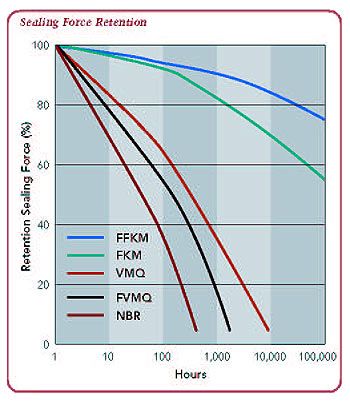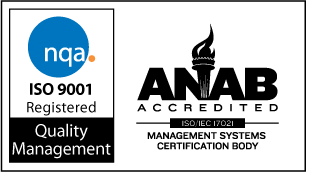
|
7108
S. Alton Way, Unit I |
(303) 758-2728
Home > Elastomer Properties > Stress Relaxation
Elastomer Properties - Stress Relaxation/Retained Sealing Force
Elastomers are viscoelastic in nature. When deformed, energy storage is always accompanied by some energy dissipation. The entanglements of the long elastomer chains act as obstructions to the movement of the polymer chains. These obstructions enable the elastomer to store energy—an elastic property. The rearrangements of the polymer chains are dependent on the specific chemical structure, time, temperature and deformation rate. Since elastomers are viscoelastic, the stored energy decreases over time. This decrease of the stored energy (seen as contact sealing force) over time is known as stress relaxation. In other words, stress relaxation is the change in stress with time when the elastomer is held under constant strain.
Common instruments for measuring stress relaxation are Lucas and Wykeham Farrance. There are three standard methods:
Method A—compression is applied at
test temperature and all
force measurements are made at test temperature.
Method B—compression and force measurements are made at ambient temperature.
Method C—compression is applied at ambient temperature and all force measurements are made at test temperature.
The three methods do not give the same values of stress relaxation. The resulting force measurements in all methods can be normalized to the initial counterforce, and expressed as a Retained Sealing Force percent.
Test Methods:
-
ISO 8013—Creep Strain Relaxation
-
ASTM D412—Creep Strain Relaxation—Tensile Properties
-
ISO 3384—Stress Relaxation

Next topic Elastomer Properties - Shear Modulus/Tear Strength/Dynamic Stress-Strain
We are located in the Denver Technological
Center in a suburb of Denver, Colorado
©1997-2017, Problem Solving Products, Inc.
Website Map | Privacy Statement
| Terms of Use

